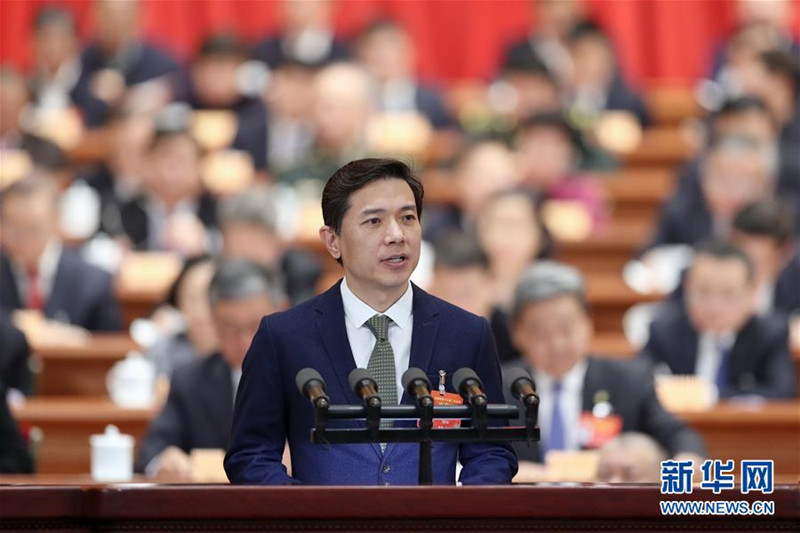AI ethics to come into focus as technology develops

Li Yanhong, chairman and CEO of Baidu, and also a CPPCC National Committee member, shares his expertise on the development of artificial intelligence. [Photo/Xinhua]
The third plenary meeting of the second session of the 13th National Committee of the Chinese People's Political Consultative Conference was held on March 10, 2019 at the Great Hall of the People in Beijing.
During the event, Li Yanhong, chairman and CEO of Baidu, and also a CPPCC National Committee member, shared his expertise on the development of artificial intelligence.
Li said AI has risen to become a national strategy serving as an important driving force of a new round of technological and industrial revolution.
The international community has already reached a consensus that AI will have a great impact on human society in the coming decades, bringing about irreversible changes. Just as ethics has been an important stabilizer for the development of human civilization for thousands of years, AI ethics will be the cornerstone of the future development of intelligent society.
Currently, AI is still at an early stage of development, but it has shown great transformative power. Machines are not only close to human capabilities in terms of speech and facial recognition, but also even beyond the ability of humans in certain aspects.
In the future, machines are expected to replace people in driving cars, diagnosing illnesses, teaching and testing products. In other words, machines will no longer be a mere tool, but may help or even partially replace people in decision-making.
"Only by establishing complete AI ethics norms and dealing with the new relationship between machines and people can we get more dividends from the sector and make technology benefit mankind," Li said.
In the past, almost every major technological reform would bring new challenges to the economic and social development, and AI has also raised concerns in society, like whether it is safe and controllable; will people be replaced by machines; and how to define the responsibilities of humans and machines.
With the widespread use of AI in people's daily lives, for example, personally identifiable information and behavioral data may be integrated to allow machines learn more about people and provide better service. But this may also raise privacy and data security issues if used improperly, so it requires people to think early and find a way to solve these ethic issues.
The guiding New Generation AI Development Plan issued by the State Council in 2017 has set 2020 as the year for establishing AI ethical standards in some fields. Some domestic enterprises also put forward related principles, such as those ensuring safety and controllability; the vision to promote more equitable access to technology and capabilities; the value of AI existence to teach people to learn and improve, not to go beyond and replace people; and the ultimate ideal of bringing more freedom and possibility for mankind.
China is in a leading position in the world in the research and application of AI technology, but its discussion on AI ethics has just begun and has no wide consensus.
Li suggested government departments should take the lead in organizing experts in interdisciplinary fields, representatives of AI enterprises, industry users and the public to carry out research and top-level design for AI ethics, in a bid to promote the improvement of people's livelihoods, boost the healthy development of the industry and grasp the initiative of a new round of technological revolution.
Efforts should be made to coordinate all parties and strengthen relevant research to clarify the AI ethical principles in fields of security, privacy and fairness by taking people's needs for a better life as the ultimate goal as well as taking the innovation and development of the industry into account. Guidelines on AI ethics should be formulated and relevant issues should be evaluated.
Also, the demonstration role of leading AI enterprises should be enhanced in popular areas such as information recommendation, autonomous driving and virtual reality to accelerate the establishment of ethical principles, and implement them in product design and business operations, with an aim to enable the information and services provided by AI to help people grow and gain more opportunities for development.
Meanwhile, enterprises are encouraged to explore and solve new AI ethics problems arising from the practice and share their experience, to realize the collaborative development of AI technology and ethics, as well as to better serve the society.
To strengthen international exchanges and build a global consensus is another focus.
"We should actively participate in the research and formulation of global AI ethical principles; identify the restricted areas; and absorb and carry forward the essence of China's excellent traditional culture such as the people-oriented concept, to make technological innovation better benefit mankind and to contribute Chinese wisdom to international AI ethics research," Li said.
The future is coming.
"Let us seize the strategic development opportunities of AI, accelerate the pace of ethical research and innovation, and create China's competitive advantages in the industry, in a bid to build an intelligent society more quickly and benefit people with the technology," he added.
Copyright © The National Committee of the Chinese People's Political Consultative Conference.
All rights reserved. Presented by China Daily.
京ICP备08100501号-1

